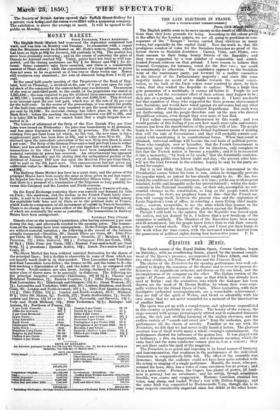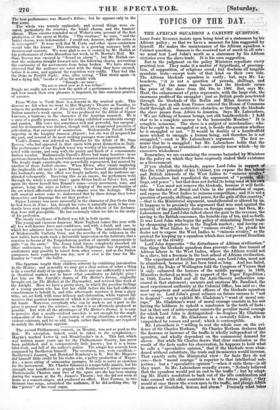44ratrti futh Rusin.
The fourth season of the-Royal Italian Opera, Covent Garden; began on Saturday, with an overflowing-house, graced . by the unusual compli- ment of the Queen's presence, accompanied by Prince Allied, and their two elder children, the. Prince of Wales and the- Princess Royal.
The choice of the Freischits for the opening performance was-well cal- culated to- display the resources of the theatre and to cover its'present de- ficiencies—its magnificent orchestra and chorus-on the one hand, and the incompleteness of- its company on the other. The Italian-version of the operas-II' Franco Aretero--is- the dune. as, that which -haa already been used' at •Beilin ; and the recitatives. into which the dialogue, has been • thrown are the work of MsHeotor Berlioz, by -whom they wereorigi-
y written flit the Grand Opera of'Paris. These recitatives1 with their deseriptive orchestral accompaniments, are a remarkable achievement:
: they are full of the spirit of Weber, and blend so admirably with- his• own .music that we are never reminded for a moment:of the intervention of another. hind.
The opera was got up with a completeness and splendour unparalleled in this country or-probably in any other. The beauty of the scenery, the stage:covered with groups picturesquely-attired-and in animated dramatic. action, the rich and swelling harmony of the mighty choruses, and the endless variety of "sounds and sweet airs" from the orchestra, gave the performance all the charm of novelty. Familiar as we are with the FreisehiiM, we felt that we had never really heath it before. The-glorious. overture was of itself worth many a whole evenings entertainment. Its performance showed the influents. of the genius loci. It was played with - a brilliancy; a fire, en impetuosity, and a dramatic meaning, which the same band and the same conductor cannot give to-it at a concert; they . are not there under-the spell of the magician. The Freischitz.is so grand and imposing in its broad masses of harmony and instrumentation, that WODIrTIORS the ro peifonnance of the, individual characters is comparatively little felt. The effect:of the ensemble was. immense; though the audience could, not have been quite satisfied-with the acting or singing of a single performer. Maralti, the tenor, who. per- soruited the hero, Max, has a voice of some sweetness but no power ; and lie is a tame actor. Formes, the Caspar, has‘plenty of . power, (if: loud- ness is power,) but no sweetnese,, and his acting, though aomatimes forcible, was coarse and exaggerated. Madame Castellan. strained .her voices sang sharp,, and loaded Weber's text with Italian frippery; and the same fault was committed by Mademoiselle Vera, though :she is in some respects considerably improved iiine.a her dkbfit at the other house.
The best performance was Massol's Milan ; but he appears only in the first scene.
The whole was warmly applauded; and several things were en- cored, particularly the overture, the bridal chorus, and the hunters' chorus. These encores reminded us of Weber's own account of the first production of the opera at Berlin. "The overture," he says, "and the bridal chorus, were redemanded : I would not, however, surer the action to be interrupted." It were well that M. Costa and other opera-conductors would take the lesson! This encoring is a growing nuisance both at theatres and concerts. We were glad to see it resisted by Mr. Hullah at his performance of Judas Macoabeus last week, in St. Martin's Hall. Mr. Sims Reeves was encored in "Sound an alarm " ; but Mr. Hullah car- ried the orchestra straight forward into the following chorus, preventing the continuity of the movements from being broken. We have always observed that the audience are sated with the thing they have encored, before it is over, and applaud the repetition very coldly. They feel like the Duke in Twelfth Night ; who, after crying, " That strain again—it had a dying fall," breaks it off in the middle with
"Enough—no more ; 'Tis not so sweet now as it was before." People are really not aware how the spirit of a perforMance is destroyed, and how much their own pleasure is impaired, by this senseless practice of encores.



























 Previous page
Previous page